Talking With Loved Ones About Mental Health Treatment
When you have a family member experiencing mental health concerns, it can be challenging to know how to help them. You’re not sure what to say, you’re fearful of saying the wrong thing, and you want to be supportive and help them seek mental health treatment. Orange County offices of Lido Wellness Center have some helpful tips for you and your loved one.
Ideally, you and your friends and family are circling this loved one to provide a community of comfort and safe space for them to be vulnerable. It’s important to handle each conversation with care, whether you’re dealing with a spouse, child, parent, sibling, or friend. Here are our best recommendations to help you play a positive role in your loved one’s journey.
How To Talk to Someone About Their Mental Health
Revealing and discussing a mental health struggle takes courage. Here are a few ways to ensure they feel heard and seen as whole people, not just patients.
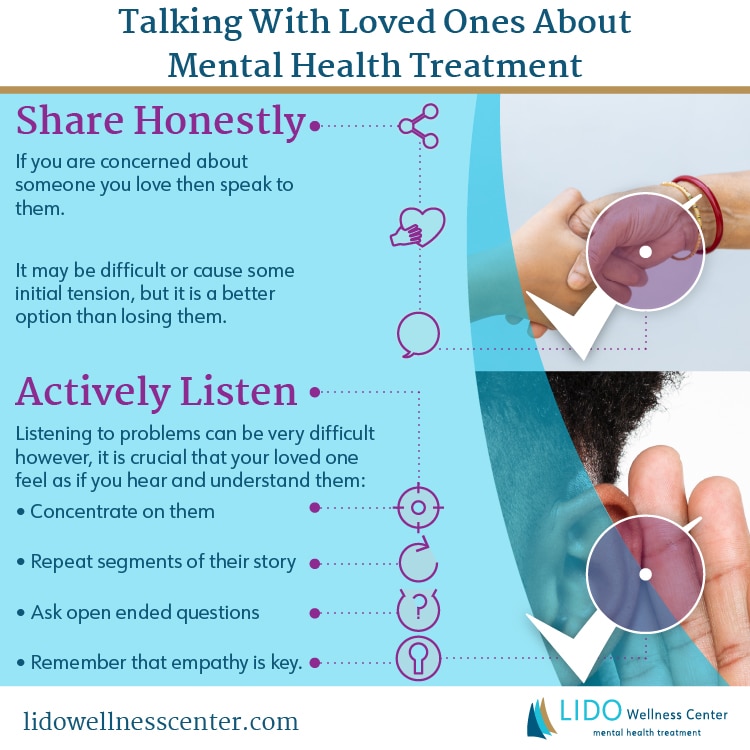
Share Honestly.
If you have concerns about a loved one, tell them. While this is upsetting for some to hear, it is much preferred to live with their temporary frustration than lose them.
Actively Listen.
It can be overwhelming to listen to all the struggles your loved one is facing, but knowing you hear and understand is essential. They need empathy more than anything else.
Concentrate on them and their story and repeat segments periodically so they know you are listening. Open-ended questions are the most effective way to encourage them to share.[/one_half_last]
[one_half]
Comparisons Aren’t Helpful.
You were most likely selected for this conversation because your loved one trusts you. You may be tempted to minimize their experience by comparing it to someone with a seemingly more challenging experience. It’s important, however, to keep the focus on them and them alone.
Don’t Pressure Them for More.
Allow them to speak uninterrupted and avoid pressuring them to share more than they’re comfortable with. Don’t give the impression that you’re rushing through the information to get to something you think is more important.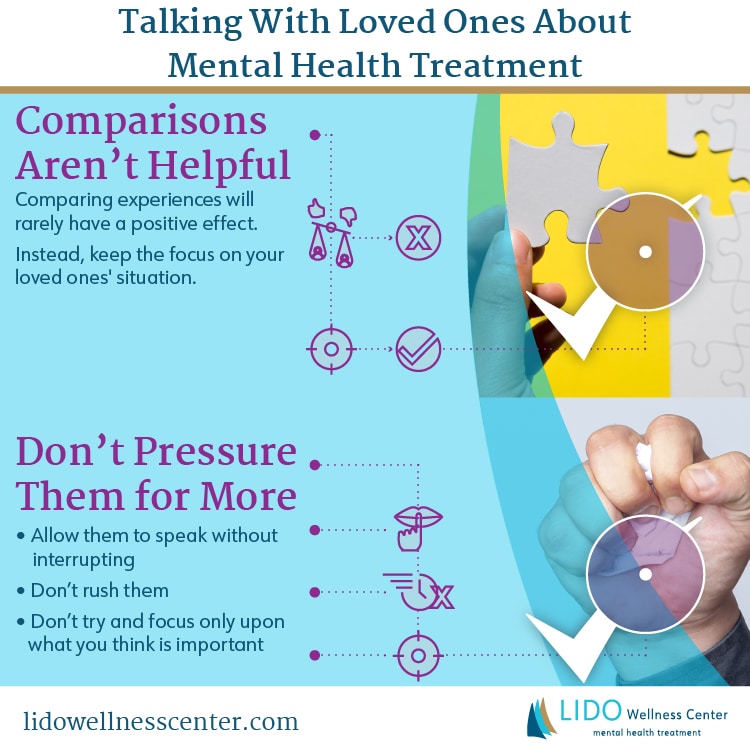 [/one_half_last]
[/one_half_last]
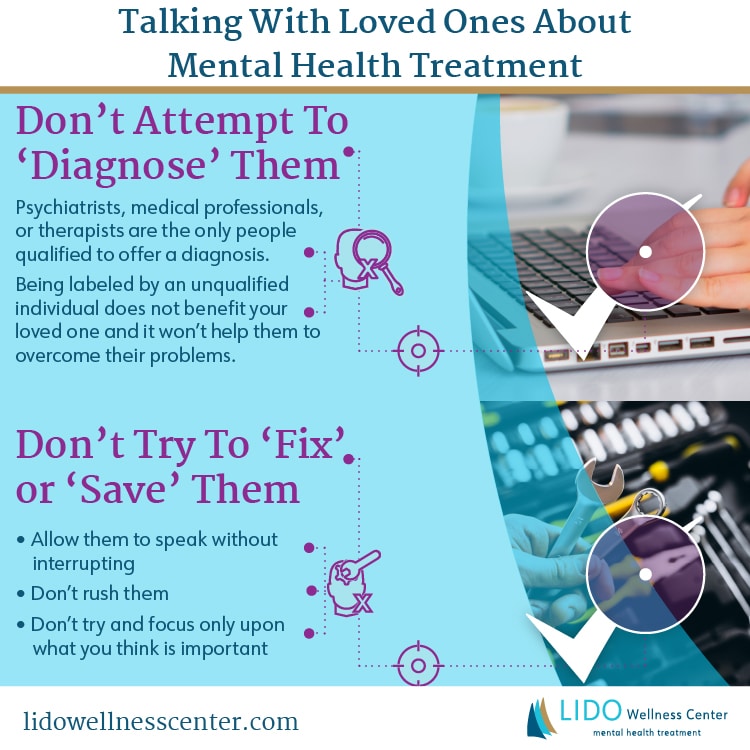 [
[
Don’t Attempt To “Diagnose” Them.
Only a psychiatrist, medical professional, or therapist can truly give an official diagnosis. You don’t want to confuse your loved one with diagnoses or treatments that may or may not apply.
This can also feel dismissive, as if slapping on a label fixes everything. At Lido Wellness Center, our compassionate patient-centered treatment plans apply an integrative mind/body/spirit holistic model guided by experienced specialists.
Don’t Try To “Fix” or “Save” Them.
Your love and support are invaluable, but you cannot take on another person’s mental health journey. You may be able to influence them, for better or worse, but “fixing” or “saving” them isn’t something you’re capable of or responsible for doing.[/one_half_last]
[one_half]
Avoid Dismissive or Judgmental Language.
While it’s tempting to try and “cheer up” our loved ones when faced with potential mental health challenges, avoiding language that feels dismissive is important. Making light of a serious situation is not what they need.
Harmful Phrases to Avoid:
- “You’re fine.”
- “Suck it up.”
- “I’m sure this will all pass.”
- “Cheer up.”
- “Snap out of it.”
- “Get over yourself.”
- “Pity party.”
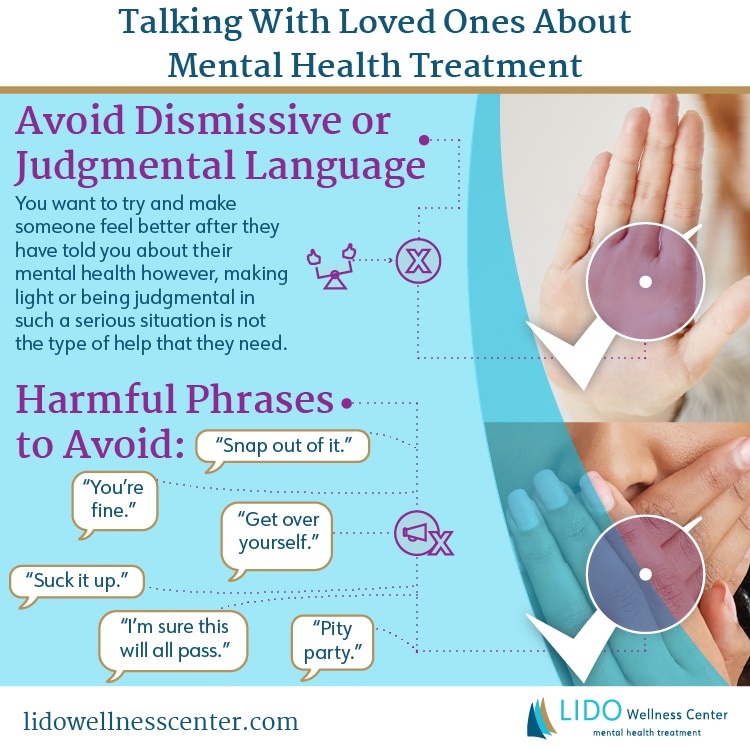 [/one_half_last]
[/one_half_last]
[one_half]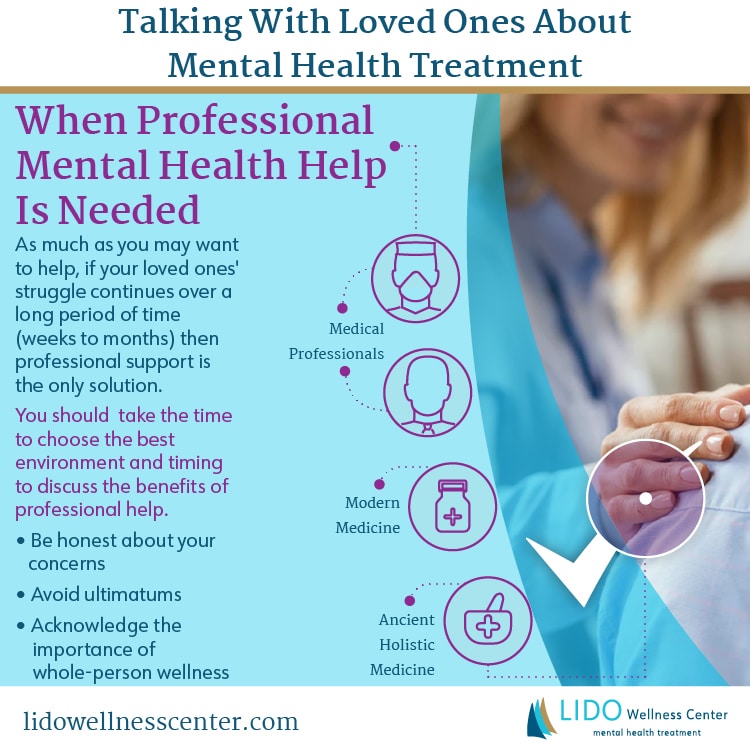 [/one_half][one_half_last]
[/one_half][one_half_last]
Know When Professional Mental Health Help Is Needed.
As hard as you try, your support may not be sufficient. If you notice their struggle drags on over a long period of time (weeks or months) or they begin showing signs of a serious condition, it’s time to consult a professional.[/one_half_last]
How To Correctly Convince Someone to Seek Mental Health Treatment in Orange County
Whether you are local to Orange County or from another region across the country, Lido Wellness can help. Many conditions are treatable with modern medicine combined with an ancient holistic, whole-person approach to mental health. It’s okay to encourage your loved one to seek help or find the most suitable mental health treatment Orange County offers for their needs.
Share honestly about your concerns for them but be sensitive to the environment and timing of your conversation. Expect some resistance but always treat loved ones with respect for their whole-person wellness.
Make sure they know how important their relationship is to you but avoid ultimatums. Help them understand that they can fully heal and grow by focusing on a holistic mind/body/spirit approach to wellness.
Consult Lido Wellness Center for A Holistic, Patient-Centered Approach
If you or a loved one are struggling with mental health challenges or if shouldering the burdens of life is overwhelming, let us help. Lido Wellness Center can help you see and achieve your next steps at our premier mental health treatment center in Orange County. Contact us today for a confidential assessment.
